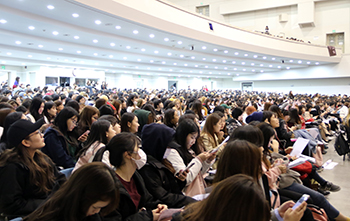
The General Assembly was held on March 29, starting off with 2,103 students, exceeding a tenth of enrolled students. The assembly was brought together in order to clarify and deliver students’ opinions for a more democratized school system, in regard to the upcoming university presidential election.
After the dishonorable resignation of the former president Choi Kyung-hee, reform of the election process for the 16th president has stirred much controversy on campus. Following the change from an indirect to a direct voting system for nominee election, students asked for an increase in the ratio of student votes, and required student participation in not only voting for the nominees but also for the president.
The first agenda of the assembly dealt with “Ewha’s Six Demands,” including the democratization of the school’s decision-making process, financial issues, improving campus facilities, demands from individual colleges, and more. The main issue of the assembly, establishing democracy in the school’s decision making process, requires the voting ratio to be 1:1:1 for professors, staff and students, and the abolishment of nominee’s age limit. The four-way consultative group announced they would settle this matter with the Student Government Association (SGA) to find a way to negotiate with students.
However, the first agenda concerning the equal voting ratio was rejected by 576 votes among 2,095 students as students deemed this to be unrealistic. Also, the task force (TF) team claimed that clinging to the 1:1:1 ratio may rupture the negotiation, and resolved to keep the 5 percent ratio for the upcoming election as well.
“If we agree to modify the voting ratio now, there is a possibility that we can increase the 5 percent student ratio to about 15 to 20 percent,” read the announcement from the TF. “Also, refusal to compromise on the 1:1:1 ratio may lead to further opposition against students within the Faculty Council, lowering the possibility for further negotiations in the future.”
The rectified first agenda, requiring an increase of student ratio without a specific number was passed by 1,578 votes among 1,953 students. According to the rectification, the second agenda’s two motions were the code of conduct to realize the first agenda: refusal of chapel service attendance, and specific guidelines to take part in modifying the election process. Among the two, the first was rejected, while the latter was passed by 889 votes among 1,776 students. The latter included participating in the four-way consultative group to confirm each group’s stance. SGA also plans to conduct a student survey from April 6 to 8 on whether to accept the consultative group’s proposal or not before the final decision on April 9.
Although the assembly ended with a passing motion, some students voiced concern over the treatment of those with different opinions during the assembly, as those who voted against the TF faced harsh verbal accusations.
“I agree that the TF works for the good of Ewha,” said a participant of the assembly. “Regardless, seeing some students blindly criticizing others who went against their opinions did not seem to reflect the idea of democracy, which is the fundamental value that we have gathered for today.”
The SGA is not the only group that failed to represent; the University Faculty Council is also facing oppositions within its members. In an attempt to solve the dissonance, University Faculty Council conducted an online survey focusing on the age limit and voting ratio to mediate professors’ opinions on the issue. However, some professors expressed their discontent over the online survey.
“The University Faculty Council survey is only increasing our distrust towards them as the focal point of each motion lacks clarity,” criticized one of the opinions posted by the nickname ‘full professor’ on the Freeboard of the online University Faculty Council. “Also, the item about suggesting the voting ratio was a question that could lead to numerous different answers.”
The response to this post insisted that instead of posting opinions expanding internal conflicts, faculty should wait and trust the University Faculty Council until the next four-way meeting. With the University Faculty Council and the SGA each failing to clearly reflect its members’ public sentiment, motions to the issue will be further settled in the four-way meeting.

